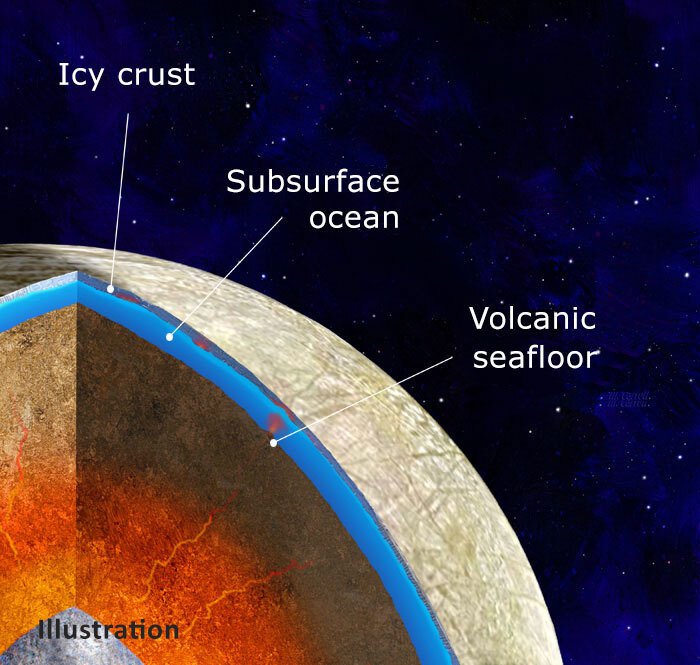This is what separates Europa, Earth, and Saturn’s small moon Enceladus—which also has a buried ocean and erupting plumes—from every other object in the Solar System, according to Cynthia Phillips, planetary geologist and Europa Clipper project staff scientist at JPL.
“In these worlds, you have an ocean layer on top of a rock layer,” she said. “That’s important because that’s what we have here on the Earth, and at the bottom of Earth’s oceans, where that ocean layer touches the rock, you can have all sorts of interesting chemical reactions take place, and hydrothermal systems.”
Scientists’ findings suggest that the interior of Jupiter’s moon Europa may consist of an iron core, surrounded by a rocky mantle in direct contact with an ocean under the icy crust. New research models how internal heat may fuel volcanoes on the seafloor.
Credit:
NASA/JPL-Caltech/Michael Carroll
At the bottom of Earth’s oceans, like at Europa, organisms must rely on an energy source other than the Sun. Hydrothermal vents in Earth’s oceans provide a heated environment teeming with primitive life forms, even in harsh conditions several miles deep.
“We don’t expect fish and whales that kind of thing, but we’re interested in whether Europa could support simple life—single-celled organisms,” Pappalardo said.
Of course, Europa Clipper won’t be able to burrow down the dozens of miles to reach these theorized vents. Scientists will have to deduce their existence through other data. And a direct detection of any living organism on Europa will have to wait for future mission. Scientists don’t think life could survive on Europa’s surface because it is bathed in extreme radiation from Jupiter’s magnetosphere.
“If there is life on Europa, in this habitable environment that we’re exploring, it would be underneath the ocean, so we wouldn’t be able to see it,” Buratti said. “We’re looking for chemicals on the surface, organic chemicals that are the precursors to life. There are dream things we could observe like DNA or RNA, but we don’t expect to see those.”
If Europa Clipper turns up something truly exciting, scientists will, no doubt, be eager to send a lander to Europa. A Europa lander would be a challenging and expensive undertaking. NASA studied how it would execute such a mission nearly a decade ago, but progress on a lander has stalled since then.





















+ There are no comments
Add yours